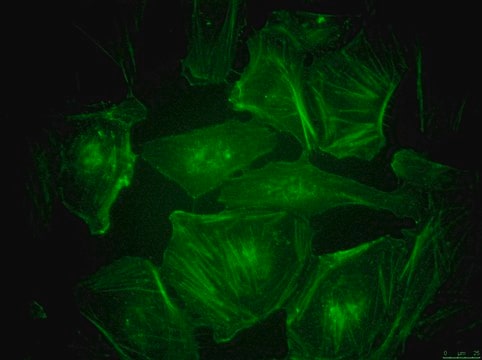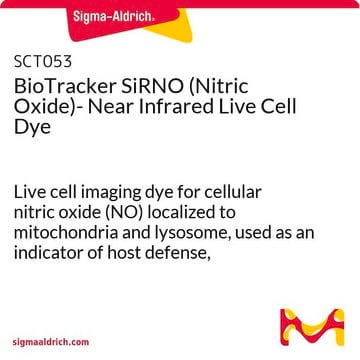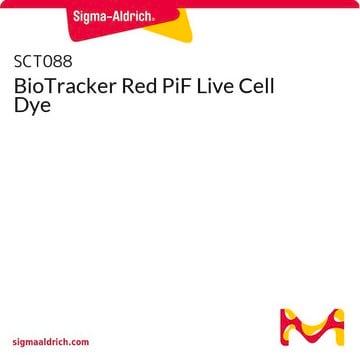SCT080
BioTracker Rd1 Hypochlorite Live Cell Dye Antibody, Green
Zaloguj sięWyświetlanie cen organizacyjnych i kontraktowych
About This Item
Kod UNSPSC:
12352207
NACRES:
NA.47
Polecane produkty
Próba
≥98% (HPLC)
Postać
lyophilized
masa cząsteczkowa
calculated mol wt 1080.94
opakowanie
pkg of 1 mg
producent / nazwa handlowa
Millipore
warunki przechowywania
desiccated
protect from light
metody
cell based assay: suitable
kolor
off-white
metoda wykrywania
fluorometric
Warunki transportu
ambient
temp. przechowywania
−20°C
Opis ogólny
Hypochlorite (HClO/ClO-) is a reactive oxygen species (ROS) produced by the enzyme myeloperoxidase (MPO), which catalyzes the reaction of hydrogen peroxide (H2O2) and chloride ion (Cl-), and plays an important role in the immune response to defend against invading pathogens. Excessive generation of hypochlorite could lead to oxidative stress, which causes inflammation and can lead to a range of diseases, including cardiovascular diseases, atherosclerosis, osteoarthritis, neuron degeneration and cancers.
BioTracker Rd1 Hypochlorite Live Cell Dye is a mitochondria-immobilized turn-on green fluorescent probe for the selective detection of hypochlorite (ClO-). The probe contains a benzoyl acetohydrazide linking site for ClO- recognition, a triphenylphosphonium group for mitochondria targeting, and a reactive methoxymaleimide subunit for mitochondrial fixation. The targeting and fixed properties of the probe enable it to accumulate in mitochondria and prevents leakage of the dye upon the decrease of mitochondrial membrane potential (MMP). This probe may be used to visualize exogenous and endogenous ClO- levels in living cells, tissues, and zebrafish.
Reference:
1. Li, M. Y., et. al. (2020). Mitochondria-Immobilized Fluorescent Probe for the Detection of Hypochlorite in Living Cells, Tissues, and Zebrafishes. Analytical chemistry, 92(4), 3262-3269.
BioTracker Rd1 Hypochlorite Live Cell Dye is a mitochondria-immobilized turn-on green fluorescent probe for the selective detection of hypochlorite (ClO-). The probe contains a benzoyl acetohydrazide linking site for ClO- recognition, a triphenylphosphonium group for mitochondria targeting, and a reactive methoxymaleimide subunit for mitochondrial fixation. The targeting and fixed properties of the probe enable it to accumulate in mitochondria and prevents leakage of the dye upon the decrease of mitochondrial membrane potential (MMP). This probe may be used to visualize exogenous and endogenous ClO- levels in living cells, tissues, and zebrafish.
Reference:
1. Li, M. Y., et. al. (2020). Mitochondria-Immobilized Fluorescent Probe for the Detection of Hypochlorite in Living Cells, Tissues, and Zebrafishes. Analytical chemistry, 92(4), 3262-3269.
Zastosowanie
Purity ≥ 98% confirmed by HPLC. Identification confirmed by HNMR, LC-MS, and elemental analysis.
Cechy i korzyści
Mitochondria-immobilized turn-on green fluorescent probe for the selective detection of hypochlorite.
Postać fizyczna
Lyophilized. Off-white solid.
Przechowywanie i stabilność
Store at -20°C, desiccate and protect from light
Note: Centrifuge vial briefly to collect contents at bottom of vial before opening
Note: Centrifuge vial briefly to collect contents at bottom of vial before opening
Inne uwagi
Live cell fluorescent imaging
Oświadczenie o zrzeczeniu się odpowiedzialności
Unless otherwise stated in our catalog or other company documentation accompanying the product(s), our products are intended for research use only and are not to be used for any other purpose, which includes but is not limited to, unauthorized commercial uses, in vitro diagnostic uses, ex vivo or in vivo therapeutic uses or any type of consumption or application to humans or animals.
Kod klasy składowania
11 - Combustible Solids
Klasa zagrożenia wodnego (WGK)
WGK 3
Temperatura zapłonu (°F)
Not applicable
Temperatura zapłonu (°C)
Not applicable
Certyfikaty analizy (CoA)
Poszukaj Certyfikaty analizy (CoA), wpisując numer partii/serii produktów. Numery serii i partii można znaleźć na etykiecie produktu po słowach „seria” lub „partia”.
Masz już ten produkt?
Dokumenty związane z niedawno zakupionymi produktami zostały zamieszczone w Bibliotece dokumentów.
Meng-Yang Li et al.
Analytical chemistry, 92(4), 3262-3269 (2020-01-21)
A mitochondria targeting and immobilized fluorescent probe (Rd1) using triphenylphosphonium as the targeting group and methoxymaleimide as the fixed site is designed for the detection of ClO-. The methoxymaleimide fixed group can react with nucleophiles, such as the reactive thiol
Nasz zespół naukowców ma doświadczenie we wszystkich obszarach badań, w tym w naukach przyrodniczych, materiałoznawstwie, syntezie chemicznej, chromatografii, analityce i wielu innych dziedzinach.
Skontaktuj się z zespołem ds. pomocy technicznej








